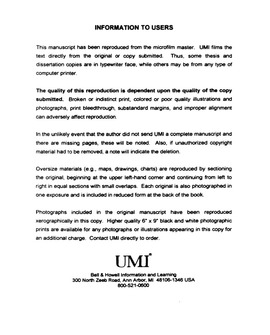| dc.contributor.advisor | Scherman, Avraham, | en_US |
| dc.contributor.author | Martin, Robert M. | en_US |
| dc.date.accessioned | 2013-08-16T12:30:49Z | |
| dc.date.available | 2013-08-16T12:30:49Z | |
| dc.date.issued | 2000 | en_US |
| dc.identifier.uri | https://hdl.handle.net/11244/5915 | |
| dc.description.abstract | The primary purpose of the present investigation was to examine the relationship between attitudes towards, and perceptual norms of, drinking behaviors and self-reported levels of drinking. In examining these associations, this study sought to provide support for Ajzen and Fishbein's (1977) theory of reasoned action. By simultaneously examining attitudes and beliefs about substance use, it was believed that the unique influence of each would be ascertained. As was predicted, drinking behavior was found to have a large association with personal attitudes toward drinking. In particular, the quantity and frequency of alcohol use that students reported, the more acceptable their personal attitudes were toward alcohol use and associated behaviors, such as drinking to get drunk and pressuring people to drink alcohol. Although there was support for friends' drinking norms being moderately associated with actual drinking behaviors, drinking norms of others mostly had no association at all to the drinking behavior of participants. These associations were nearly zero. Thus, in this study the more that students reporting using alcohol, the more they reported their friends as using alcohol, yet their drinking behavior was independent of the drinking norms of other students. Finally, the data from this study clearly indicate that perceived risk of alcohol use is a crucial variable in explaining college students' alcohol use. Despite the desire to interpret causally this association, all that is presently known is that alcohol use and perceived risk of harm of alcohol use are strongly inversely related. This study provides firm support for being aware of students' attitudes toward drinking, the drinking norms of their friends, and their perceived risk of using alcohol. All three of these factors appear to be strongly associated with students' drinking behavior. | en_US |
| dc.format.extent | ix, 127 leaves ; | en_US |
| dc.subject | Psychology, Behavioral. | en_US |
| dc.subject | College students Alcohol use Oklahoma. | en_US |
| dc.subject | Education, Health. | en_US |
| dc.subject | Public opinion Oklahoma. | en_US |
| dc.subject | Psychology, Social. | en_US |
| dc.subject | College students Oklahoma Attitudes. | en_US |
| dc.subject | Drinking of alcoholic beverages Oklahoma Public opinion. | en_US |
| dc.subject | Health Sciences, Public Health. | en_US |
| dc.title | Students' attitudes and perceptions as predictors of drinking behavior: Implications for student alcohol education programs. | en_US |
| dc.type | Thesis | en_US |
| dc.thesis.degree | Ph.D. | en_US |
| dc.thesis.degreeDiscipline | Department of Educational Psychology | en_US |
| dc.note | Source: Dissertation Abstracts International, Volume: 61-02, Section: A, page: 0515. | en_US |
| dc.note | Adviser: Avraham Scherman. | en_US |
| ou.identifier | (UMI)AAI9961562 | en_US |
| ou.group | Jeannine Rainbolt College of Education::Department of Educational Psychology | |
